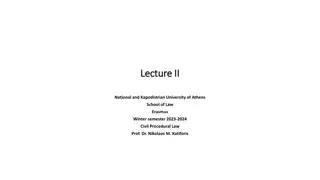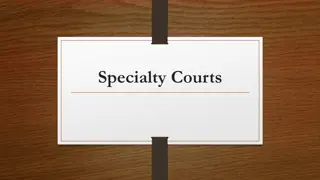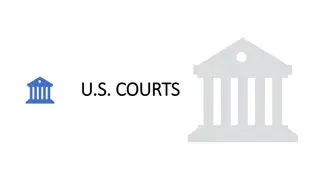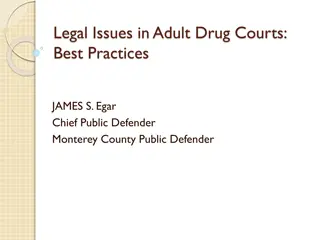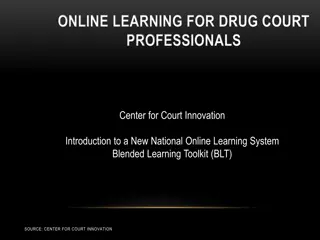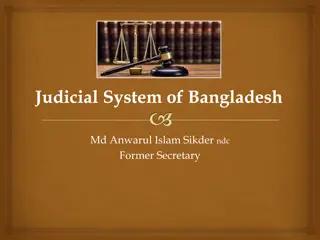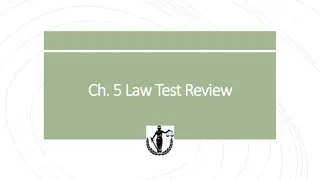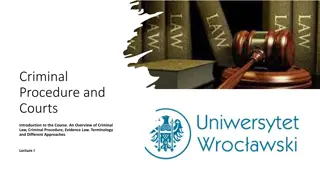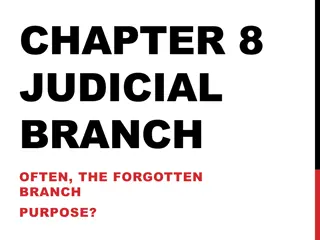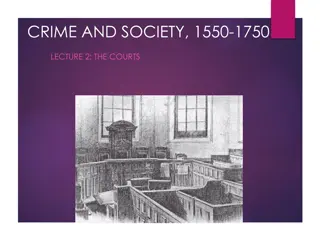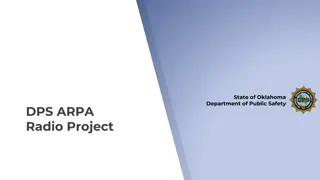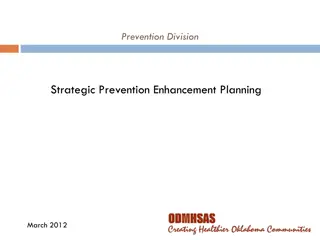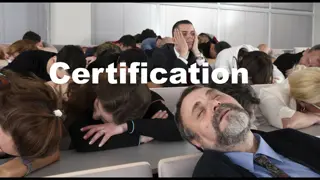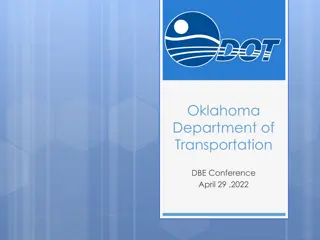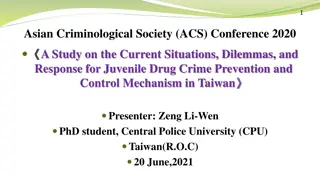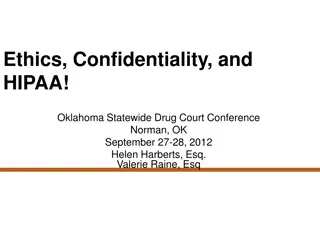Legal Issues in Drug Treatment Courts at Oklahoma Statewide Conference
This presentation covers constitutional and legal issues related to drug treatment courts, including eligibility criteria, equal protection under the 14th Amendment, and jurisdictional decisions. It delves into aspects such as strict scrutiny, intermediate level scrutiny, and rational relationship to government purpose. Case law examples highlight the importance of adherence to legal standards in drug court operations.
Download Presentation

Please find below an Image/Link to download the presentation.
The content on the website is provided AS IS for your information and personal use only. It may not be sold, licensed, or shared on other websites without obtaining consent from the author. Download presentation by click this link. If you encounter any issues during the download, it is possible that the publisher has removed the file from their server.
E N D
Presentation Transcript
Constitutional and Other Legal Issues in Drug Treatment Courts Oklahoma Statewide Drug Court Conference Norman, OK September 27-28, 2012 Valerie Raine, Esq. Center for Court Innovation
Eligibility and Equal Protection 14th Amendment Persons similarly situated will receive like treatment Strict Scrutiny? infringes on a fundamental right or categorizes on the basis of race or national origin or suspect class Intermediate Level? liberty right or semi-suspect class Rational Relationship to a Legitimate Government Purpose?
Jurisdictions decision not to develop a drug court is rationally related to a legitimate government purpose Lomont v. State, 852 N.E. 2d 1002 (Ind. App. 2006) Indiana did not require all counties to have drug diversion programs State v. Harner, 103 P. 3d 738 (Wash. 2005) - drug court available in adjacent county but not where D is arrested State v. Little, 66 P.3d 1099 (Wash. App. 2003) counties can decide how to implement scarce resources People v. Forkey, 72 A.D.3d 1209 (N.Y.App. Div. 2010) no hearing required before being rejected for drug court
Refusal to offer drug court to all defendants does not constitute denial of equal protection because there exists no right to enter drug court Jim v. State, 911 So. 2d 658 (Miss. App. 2005) Denial of Motion to transfer case to drug court on first day of trial falls within judge s discretion and statute specifically stated no right to participate in drug court.
Eligibility Permissible criteria Severity and type of offense violence, sex offenses Immigrant status may not be able to complete program Individuals on methadone maintenance Individuals using medical marijuana - cannot as matter of law exclude (People v. Beaty, 181 Cal.App.4th644(Cal.2010) but see U.S.v.Lafley,2010 WL 174509 (United States District Court of Montana 2010) illegal under federal law
Equal Protection (cont.) Evans v. State, 667 S.E.2d 183 (Ga. Ct. App. 2008) D was HIV positive claimed violation of EP and ADA re: rejection from drug court. Rejection based on onerous medical requirements and ADA not implicated because D could not demonstrate that his disabilities affected major life activities. But note possible ADA implications Reasonable modifications vs. fundamental alteration of procedures or undue financial hardship
Conditions of Drug Court Contract 4th Amendment Waiver of Probable Cause for Search of Person and Property Unconstitutional Conditions Doctrine Doctrine of Criminal Waiver Special Needs Doctrine
Drug Court Participant on Probation or Post-Plea Model Griffin v. Wisconsin, 483 U.S. 868 9 (1987), Generally permitted but may need reasonable suspicion. United States v. Knights,534 U.S. 112 (2001) Search of probationer based on reasonable suspicion but pursuant to suspicionless search condition of probation is permissible under totality of the circumstances test. Samson v. Calif., 126 S. Ct. 2193 (2006) Permitted search of parolee based solely on execution of waiver officer did not suspect criminal activity but relied on provision of CA law authorizing suspicionless searches.
Scope of 4th Amendment Waiver Co-inhabitant may be able to withhold consent to search of common living areas Georgia v. Randolph, 547 U.S. 103 (2006)
Drug Court Participant in Diversion Program Search based solely on waiver for offenders before conviction is probably unconstitutional Terry v. Superior Court, 73 Cal. App. 4th 661 (Cal. App. 1999) U.S. v. Scott, 450 F3d 863 (9th Cir. 2006)
Conditions of Drug Court (cont) 1st Amendment Area & Association Restrictions Pre-plea and Post-plea distinction
Area Restrictions Factors Compelling Need to Go to Location Mechanism for Supervised Entry Size of the Area Relationship to Rehabilitation of Offender
Area Restrictions Permissible Oyoghok v. Municipality of Anchorage, 641 P.2d 1267 (Alaska 1982) - Two block radius Johnson v. State, 547 So.2d 1048 (Fla. App. 1989) Near high drug areas State v. Morgan, 389 So. 2d 364 (La. 1980) - Stay out of French Quarter
Area Restrictions, cont.d Not Permissible State v. Wright, 739 N.E.2d 1172 (Ohio App. 2000) - Any place where alcohol is sold, served, consumed
Association Restrictions Reasonably Related to the Purposes of Probation, the Prevention of Crime, and Protection of the Public Andrews v. State, 623 S.E.2d 247 (Ga. App. 2005) Drug users and dealers People v. Tungers, 127 Cal. App. 2005) - Wife People v. Forsythe, 43 P.3d 652 (Colo.App. Ct. 2001) could only have supervised contact with children
Association Restrictions, cont.d Other permissible restrictions Motorcycle clubs Any Irish organization, Malone v. United States, 502 F.2d 554 (9thCir. 1974) Specific gang members Person with criminal records, if individual knows of , records, Birzon v. King, 469 F.2d 1241 (2d Cir.1972)
Association Restrictions, cont.d But, Too Broad Dawson v. State, 894 P.2d 672 (Alaska App. 1995) - Any unsupervised contact with drug using wife
Restrictions on Dress Restrictions on dress that are too vague violate 1st Amendment, U.S. v. Brown, 223 Fed.Appx. 722 (9thCir. 2007) Restrictions must be reasonably related to offense or future criminality, State v. Hicks, 1999 WL 997297 Ohio
Establishment Clause 1st Amendment Establishment Clause and Treatment Establishment Clause of the 1st Amendment Prohibits Mandating Participants to Attend AA or NA Meetings
Establishment Clause, cont.d Court or treatment provider can make AA and NA available so long as participation is not mandatory and other options are available Kerr v. Farrey, 95 F.3d 472 (7th Cir. 1996) - prisoner can t be mandated to treatment w/explicit religious content Griffin v. Coughlin, 88 N.Y.2d 674 (1996) - couldn t condition prisoner s visits with wife on AA/NA must offer alternative program Destefano v. Emergency Housing Group, Inc., 247F.3d397 (2d Cir. 2001) State tax revenues can go to private treatment provider so long as staff don t inculcate patients with AA doctrine
Establishment Clause, cont.d Inouye v. Kemma, 504 F.3d 705 (9th Cir. 2007) - parole officer lost immunity because he forced AA on a Buddhist Hanas v. Inner City Christian Outreach, 542 F. Supp.2d 683 (E.D. Mich. 2008) - program liable for prohibiting patient from practicing Catholicism
Secular Alternatives SMART Recovery Secular Organizations for Sobriety (SOS) Life Ring
Drug Testing and Due Process To satisfy due process concerns, drug tests should be scientifically reliable Daubert v. Merrell Dow Pharmaceuticals, 509 U.S. 579 (1993) Frye v. United States, 293 F.3d 1013 (1923)
Types of Drug Tests Urine Instrumented vs. non-instrumented tests Non- instrumented cups or dip sticks are screens; GC/MS testing should be used to confirm in cases of denial by participant Sweat Patch usually attached for one week subject to environmental contamination Hair environmental contamination EtG (Ethyl Glucuronide) metabolite of alcohol found in urine high risk of incidental exposure SAMHSA advisory about risks of relying solely on EtG results: http://etg.weebly.com/uploads/7/4/7/5/74751/etg.samhsa.advisory.pdf
Reliability of Drug Tests EMIT Found to be reliable Matter of Lahey v. Kelly, 518 N.E.2d 924 (N.Y. 1987); Spence v. Furrier, 807 F.2d 753 (8th Cir. 1986); Jones v. State, 548 A.2d 35 (D.C. 1998) Sweat Patch Generally found reliable but concerns with environmental contamination U.S. v. Alfonzo, 284 F.Supp.2d 193 (Mass. 2003) Hair High risk of environmental contamination Wykoff v. Resig, 613 F. Supp. 1504 (N.D. Ind. 1985); Thomas v. McBride, 3 F.Supp. 989 (N.D. Ind. 1998)
Alcohol and Drug Testing Cont Certificates of analysis qualify as testimony and analysts as witnesses - under the Confrontation Clause of the 6th amendment. Melendez-Diaz v. Massachusetts, 129 S.Ct. 2527 (2009) Because blood-alcohol analysis reports are testimonial, defendants have the right to confront the analyst who certified their sample at trial, unless the analyst is unavailable and the accused had an opportunity, pretrial, to cross-examine that particular scientist. Bullcoming v. New Mexico, 131 S.Ct. 2705 (2011).
Sanctions and Due Process Factors Pre-plea vs. Post-plea Model Contested vs. Non-Contested Factual Basis Due Process Rights of Parolee or Prison Inmate
Right to Hearing Sanctions Participant can prospectively waive right to a hearing on a sanction in drug court contract State v. Rogers, 144 Idaho 738; 170 P.3d 881 (2007) Contract rules govern when sanctions are imposed (different result with termination)
Termination from Drug Court and Due Process States vary on what process is due Many states analogize drug court participant status to that of a probation violator (assuming participant has entered a plea) If program follows pre-plea diversion model, more due process!
Termination, cont.d Probation Revocation Hearing Analysis Written Notice Disclosure of Evidence Opportunity to be Present and Testify Right to Confront and Cross-Examine Witnesses Neutral Magistrate Written Findings of Evidence and Decision Gagnon v. Scarpelli, U.S. 778 (1973)
Termination, cont.d Hearing required People v. Anderson, 833 N.E.2d 390 (Ill. App. Ct. 2005) Drug court termination requires hearing State v. Perkins, 661 S.E.2d 366 (S.C. App. 2008) Drug court termination required notice and hearing State v. Rogers, 144 Idaho 738; 170 P.3d 881 (2007) Idaho Supreme Court required same rights as those accorded a probationer facing revocation.
Termination, cont.d Nebraska v. Shambley, 795N.W.2d 884(Sup.Ct.Neb.2011) Documents containing only hearsay cannot constitute sole basis for termination from drug courts drug court participant accorded probation/parole violation hearing rights preponderance of the evidence standard. Gosha v. State, 931 N.E.2d 432 (Ind. Ct. App. 2010) and Harris v. Commonwealth, 689 S,E. 2d 713 (Va. 2010) Drug court participants are entitled to hearings because drug court affects liberty interest.
But Not Always!! New York Standard Evidentiary hearing not required Preponderance of evidence not required Court must conduct sufficient inquiry to satisfy itself that there was a legitimate basis for program decision Court must put findings on the record People v. Fiammegta, 14 N.Y.3d 90; 923 N.E.2d 1123 (2010)
Waiver of Hearing Rights State v. Rogers, 144 Idaho 738, (Idaho 2007) Footnote suggests the rights can be waived but no indication of waiver leaves open question of when can they be waived Staley v. State, 851 So.2d 805 (Fla. App. 2003) Defendant could not prospectively waive his right to contest future allegations of violations State v. LaPlaca, 162 N.H. 174 (2011) Cannot waive right to a hearing prior to that right being implicated
Scope of Waiver of Right to Appeal Defendant s general waiver of right to appeal did not foreclose review of his contention that he was denied his right to due process People v. Kitchens, 46 A.D.3d 577 (2d Dept.) (2007) Waiver of right to appeal encompassed original sentence of probation, not the sentence following defendant s violation of probation People v. Dexter, 71 A.D.3d 1504 (4thDept.) (2010)
Judicial Impartiality and Due Process Termination Hearings Neither Actual nor Apparent Bias Standard Objective Recusal Preferred Option where Factual Basis Contested
Recusal at Termination Hearings Alexander v. State, 48 P3d 110 (Okla. 2002) Oklahoma Supreme Court does not require recusal but saw potential for bias when Drug Court judge presides over termination proceeding in future cases, judge should recuse if drug court participant makes a motion claiming potential bias.
Double Jeopardy Dimeglio v. State, Court of Special Appeals of Maryland (2011) Multiple punishments admissions by drug court participant to new crime in front of drug court judge who then sanctions with jail does not constitute double jeopardy
Brown v. State of Maryland Challenge to Maryland s problem-solving courts Question of fundamental jurisdiction Sanctions and double jeopardy 406 Md. 579, 961 A.2d 553, (2008)


